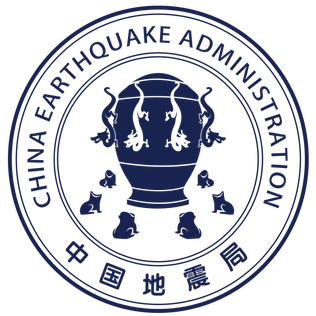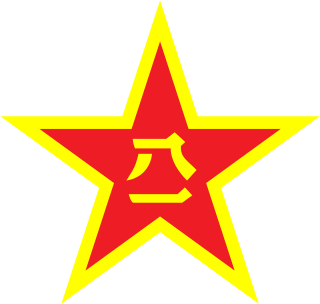Related Research Articles

The National Ethnic Affairs Commission is a body under the leadership of the United Front Work Department of the Central Committee of the Chinese Communist Party that is responsible for administering the Chinese ethnic policies, researching ethnological theories, carrying out ethnic work and education, supervising the implementation and improvement of the system of regional ethnic autonomy, and overseeing the protection of the rights and interests of ethnic minorities in China.

Zhao Hongzhu is a retired Chinese politician and a previous member of the Chinese Communist Party's national leadership. Zhao served as the Deputy Secretary of the Central Commission for Discipline Inspection (CCDI), the Communist Party's anti-corruption agency, as well as a Secretary of the Central Secretariat.

The China Earthquake Administration is a public institution managed by the State Council at the deputy ministerial level in charge of national earthquake disaster reduction work. It is currently managed by the Ministry of Emergency Management.
Xiang Junbo is the former chairman of the China Insurance Regulatory Commission (CIRC).

The Li Keqiang Government was the Central People's Government of China from 15 March 2013, when Premier Li Keqiang took office, until March 2023. It succeeded the Wen Jiabao government. Premier Li was ranked only second to Party general secretary Xi Jinping among 7 members of the 18th and 19th Politburo Standing Committee, top decision-making body of the Chinese Communist Party (CCP).
The Eight-point Regulation from the Central is a set of Chinese Communist Party regulations stipulated by the Politburo in 2012 aimed at instilling more discipline among party members and making the party "closer to the masses". They were first announced on 4 December 2012, after a Politburo meeting led by Xi Jinping, who then had recently became General Secretary of the CCP. Detailed implementing regulations were adopted by the Politburo in 2022.
Over one hundred officials of provincial-ministerial level and above have been implicated by the anti-corruption campaign in China, which began after the 18th National Congress of the Chinese Communist Party in 2012. The number of officials implicated below the provincial level are much higher. The tables on this list includes only officials for which a case has been initiated by the Central Commission for Discipline Inspection.
Chang Xiaobing is a Chinese former business executive. He served as the chairman of China Unicom from 2004 to 2015, and the chairman of China Telecom in 2015. On December 27, 2015, Chang was placed under investigation by the Communist Party's anti-corruption agency. He is the first head of telecommunications in China implicated since the beginning of Xi Jinping's anti-corruption drive after he took power in late 2012.

The General Office of the Central Military Commission, simply known as the CMC General Office or the Military Office, is an administrative agency of the Central Military Commission of Theater Deputy-grade, which assists the leaders with the day to day administrative operations of the CMC. Like all other CMC departments, it is a two names, one agency organization with both a state and Communist party name.

The Logistic Support Department of the Central Military Commission is a first-level functional department of Theater Deputy grade under the Central Military Commission of the People's Republic of China. It was founded on January 11, 2016, under Xi Jinping's military reforms. The department organizes and leads the logistics unit construction and development, as well as administering and overseeing the barracks, housing, supplies, and hospitals of the People's Liberation Army. It is based in 22 Wanshou St, Hadian District, Beijing. Its first director was Gen. Zhao Keshi. The current director is Lt. Gen. Zhang Lin.

The Office for Strategic Planning of the Central Military Commission is the chief organ under the Central Military Commission of the People's Republic of China. It was founded on January 11, 2016, under Xi Jinping's military reforms.

The Office for Reform and Organizational Structure of the Central Military Commission is the chief organ under the Central Military Commission of the People's Republic of China. It was founded on January 11, 2016, under Xi Jinping's military reforms. Lt. Gen. Qin Shengxiang served as its first director.
Wang Bao'an is a former Chinese politician who served as director of the National Bureau of Statistics since April 2015. On January 26, 2016, Wang was placed under investigation by the Central Commission for Discipline Inspection.
Li Jianbo is a Chinese politician. At the height of his career, he served as a member of the Central Commission for Discipline Inspection (CCDI), the party's highest internal-control institution. He was removed from membership of the CCDI in January 2017.

The People's Congress of the Tibet Autonomous Region is the local people's congress of the Tibet Autonomous Region. Following decisions taken by the National People's Congress of the People's Republic of China, the founding of the Tibet Autonomous Region and the regional government was officially announced during the first session of the Tibetan People's Congress in September 1965 in Lhasa.

Meng Xiangfeng is a Chinese politician who is currently the executive deputy director of the General Office of the Chinese Communist Party.
The 20th Central Commission for Discipline Inspection (CCDI) was elected at the 20th National Congress of the Chinese Communist Party on 22 October 2022. At its 1st Plenary Session, the Central Commission for Discipline Inspection nominated its candidates for secretary, deputy secretaries, secretary-general and other members of the 20th CCDI Standing Committee. These were later approved by the 20th Central Committee at its 1st Plenary Session on 23 October 2022.
The Standing Committee of the 20th electoral term of the Central Commission for Discipline Inspection (CCDI) was elected by the CCDI's 1st Plenary Session on 23 October and approved by the 20th Central Committee at its 1st Plenary Session later that same day. The Standing Committee is composed of the CCDI secretary, deputy secretaries, secretary-general and other members.

Working Committee of the Central and State Organs of the Central Committee of the Chinese Communist Party is an agency dispatched by the Central Committee of the Chinese Communist Party, responsible for the work of the central and state organs of the Party. It is mainly responsible for organizing, planning, and deploying the work of the Party in central and state organs, guiding the political, ideological, organizational, work style, and disciplinary construction of the Party in central and state organs, guiding the Party organizations at all levels in central and state organs to implement supervision and management of Party members, especially Party members and leading cadres, leading the Party discipline inspection work of various departments in central and state organs, and centrally guiding the Party building work of industry associations and chambers of commerce.
Li Xinran is a Chinese politician serving as the Secretary-General of the Central Commission for Discipline Inspection (CCDI) since 2022. Previously, he served as the Chief Inspector of the CCDI Discipline Inspection Office at the China Banking Regulatory Commission and the Chief Inspector of the CCDI and NSC Discipline Inspection Office at the China Banking and Insurance Regulatory Commission.
References
- ↑ "组织机构" [Organization]. Central Commission for Discipline Inspection. 12 April 2021. Retrieved 24 July 2024.
- ↑ "组织机构" [Organization]. Central Commission for Discipline Inspection. 17 March 2014. Archived from the original on 17 March 2014. Retrieved 24 July 2024.